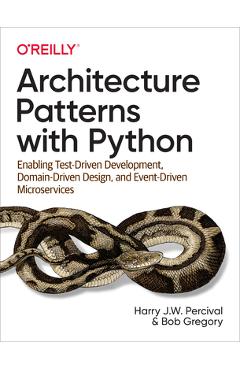Architecture Patterns with Python: Enabling Test-Driven Development, Domain-Driven Design, and Event-Driven Microservices - Harry Percival

Detalii Architecture Patterns with Python: Enabling
libris.ro
368.23 Lei
409.14 Lei
Computers
Harry Percival
Architecture Patterns with Python: Enabling - Disponibil la libris.ro
Pe YEO găsești Architecture Patterns with Python: Enabling de la Harry Percival, în categoria Computers.
Indiferent de nevoile tale, Architecture Patterns with Python: Enabling Test-Driven Development, Domain-Driven Design, and Event-Driven Microservices - Harry Percival din categoria Computers îți poate aduce un echilibru perfect între calitate și preț, cu avantaje practice și moderne.
Preț: 368.23 Lei
Caracteristicile produsului Architecture Patterns with Python: Enabling
Comandă Architecture Patterns with Python: Enabling Online, Simplu și Rapid
Prin intermediul platformei YEO, poți comanda Architecture Patterns with Python: Enabling de la libris.ro rapid și în siguranță. Bucură-te de o experiență de cumpărături online optimizată și descoperă cele mai bune oferte actualizate constant.
Descriere magazin:
As Python continues to grow in popularity, projects are becoming larger and more complex. Many Python developers are taking an interest in high-level software design patterns such as hexagonal/clean architecture, event-driven architecture, and the strategic patterns prescribed by domain-driven design (DDD). But translating those patterns into Python isn\'t always straightforward. With this hands-on guide, Harry Percival and Bob Gregory from MADE.com introduce proven architectural design patterns to help Python developers manage application complexity--and get the most value out of their test suites. Each pattern is illustrated with concrete examples in beautiful, idiomatic Python, avoiding some of the verbosity of Java and C# syntax. Patterns include: Dependency inversion and its links to ports and adapters (hexagonal/clean architecture) Domain-driven design\'s distinction between Entities, Value Objects, and Aggregates Repository and Unit of Work patterns for persistent storage Events, commands, and the message bus Command-query responsibility segregation (CQRS) Event-driven architecture and reactive microservices

Produse asemănătoare

Architecture Patterns with Python: Enabling Test-Driven Development, Domain-Driven Design, and Event-Driven Microservices - Harry Percival
![]() libris.ro
libris.ro
Actualizat in 28/10/2025
368.23 Lei
Produse marca Harry Percival

Architecture Patterns with Python: Enabling Test-Driven Development, Domain-Driven Design, and Event-Driven Microservices - Harry Percival
![]() libris.ro
libris.ro
Actualizat in 28/10/2025
368.23 Lei


